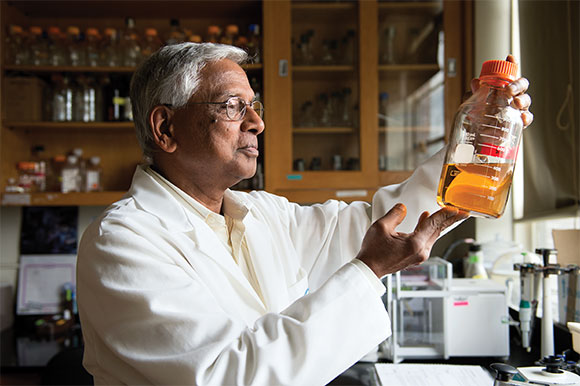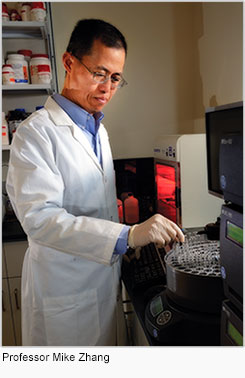PHILANTHROPY

When you visit the meat counter, technology and research probably do not come to mind. Yet every package of bacon and every pork chop on display is the product of an industry focused on complex, advanced technologies.
Food producers and processors rely on research to meet the needs of a growing population in the most cost-effective, responsible manner possible. Some of that research is taking place at Virginia Tech.
A recent $1.4 million gift from Smithfield Foods Inc. supports studies in the College of Agriculture and Life Sciences and the Virginia-Maryland College of Veterinary Medicine that aim to enhance animal well-being and production efficiency in the pork industry.
"Agriculture is a technology-driven business," said Terry Coffey, chief science and technology officer for the Smithfield Foods hog production division. "We are experiencing change at the global level. Projected population growth, human health, and antibiotic use are among the challenges facing growers. We have a responsibility to support research that is likely to result in solutions for these complex issues."
Dennis Treacy (forestry and wildlife '78) serves as Smithfield's chief sustainability officer and oversees the Smithfield Foundation. "Through our contributions to universities like Virginia Tech," he said, "we are directly engaging the academic experts who can drive industry innovations for issues that have not even been thought of yet—finding solutions that are proactive, not reactive."

According to Cyril R. Clarke, dean of the veterinary college, the Smithfield funds will advance swine health via three research projects. "Such partnerships between industry and research universities are essential to control infectious diseases and secure a safe and wholesome food supply," he said.
Led by William S. "Terry" Swecker Jr., a professor in the Department of Large Animal Clinical Sciences at the veterinary college, the first of the three projects is developing transmission models to identify how and when pigs are most likely to contract swine influenza virus. Such knowledge may aid prevention planning and assessment.
A second research initiative will explore the use of recombinant universal vaccines against porcine reproductive and respiratory syndrome, which hinders reproduction. According to lead researcher Mike Zhang, a professor of biological systems engineering in the College of Agriculture and Life Sciences, the vaccine will be designed to stimulate the immune system without risking the health of the pigs.
"In two years we should know the viability of the vaccine," Zhang said. "Once we have established its effectiveness, we can explore better delivery methods that may result in more efficient swine-health management."
Nammalwar "Nathan" Sriranganathan, a professor of biomedical sciences and pathobiology at the veterinary college, leads the third project: a study to determine the viability of developing a recombinant vaccine to control boar taint, an offensive taste and odor that can be found in products derived from uncastrated male pigs.
Sriranganathan aims to develop a modified contraceptive vaccine that, inhibiting the hormones that cause the taint, will be more effective and safer to administer than castration.
"These projects and others like them help Virginia Tech invent the future," said Alan Grant, dean of the College of Agriculture and Life Sciences. "We appreciate Smithfield Foods' support for research that brings the promise of a healthy planet, healthy food, and healthy people."
Produced by University Relations